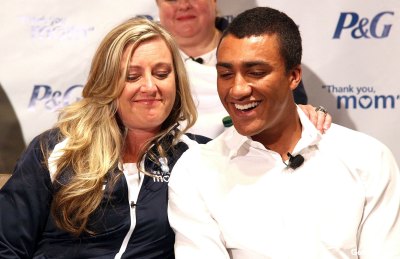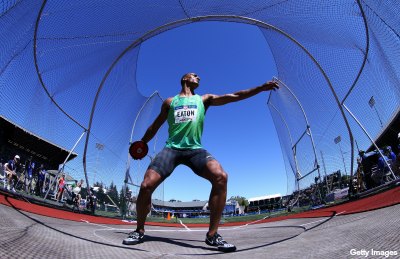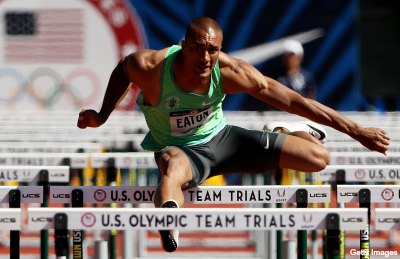Ashton Eaton was always a phenomenal athlete -- someone who seemed capable of doing anything. While playing a range of youth sports, including baseball, soccer and wrestling, he also earned a black belt in taekwondo.
In high school, his talents were most evident in football and track. As a junior from Bend, Oregon, he finished second in the long jump at the state championships. The next year, he came back and took first, along with a win in the 400-meter run.
It was clear Eaton had a chance to go to college on a scholarship. That was important: As the son of Roslyn Eaton, a single mother working multiple jobs to pay the bills, he knew a scholarship was his only shot to continue his education. But as he sorted through his options, Eaton wasn't exactly being recruited as a prized athlete, much less a future Olympian.

"Going to college was always a massive goal for myself and my family," Eaton says. "My senior year, I was looking at Division-II and Division-III schools for football and track. But I had a really good high school track coach."
And that coach, Tate Metcalf of Mountain View High School, had an idea: With all of his athletic versatility -- success in both track and field events, not to mention his multi-sport experience -- why not try the decathlon?
"And I said, 'What's the decathlon?'" Eaton says.
The decathlon -- a competition comprised of 10 different track and field events, designed as a well-rounded measure of athleticism across multiple disciplines -- is rarely featured at the high school track level. In Oregon, where Eaton lived, it wasn't an option. But once Metcalf introduced Eaton, the young athlete was all too eager to give it a try.

By shifting his focus toward decathlon, Eaton saw new doors to a college scholarship open up to him -- including perhaps the greatest door of them.
The University of Oregon offered the kid from Bend a scholarship to join its vaunted track and field program, where he would specialize in the decathlon.
And here's how that decision played out: Eaton transformed from a lightly recruited multi-sport athlete into the greatest decathlete the world has ever seen. In college, he was a two-time national champion in the decathlon, and also won a championship in the heptathlon at the indoor track and field championships. In 2009, he was named the Division I athlete of the year across all collegiate sports.
Since turning pro, Eaton has won six world championship, including a gold medal at the 2012 Summer Olympic Games. He currently holds the world record in both the decathlon and the heptathlon, with a decathlon score of 9,045.
After qualifying for this year's U.S. Track and Field Olympic team, Eaton will attempt to defend his gold medal in the decathlon next month in Rio. With endorsement deals from Gillette, Coca-Cola and Visa, the sport has given him a life he might never have anticipated as kid.

But given the long shadow cast by his professional achievements, it's easy to overlook how that small decision as a high schooler was more life-changing than anything he's done since.
For any kid whose family can't afford it on their own, sports presents a path to a better life, and more opportunities. Earning a college degree was Eaton's primary goal, later overshadowed by his utter dominance on a global stage.
It's chilling to think how Eaton's life was changed by that simple casual observation from those close around him -- not only in recognizing that he was a college-caliber athlete, but also having the foresight to suggest a sport he'd never before encountered.
But as his versatile background had already showed, Eaton was built to be a decathlete. He's just fortunate Metcalf and his mother helped him find his calling.
More Olympic Games:
-- Ashton Eaton Embodies Modern Athlete's Business/Social Media Savvy
-- Carlin Isles Uses Sprinting Start To Become Rugby Olympian
-- Russia's Track and Field Team Barred From Rio Olympics





